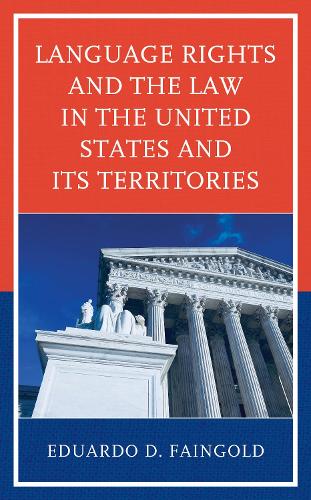
Language Rights and the Law in the United States and Its Territories
(Paperback)
Available Formats
Publishing Details
Language Rights and the Law in the United States and Its Territories
By (Author) Eduardo D. Faingold
Bloomsbury Publishing PLC
Lexington Books
7th July 2020
United States
Classifications
Professional and Scholarly
Non Fiction
Constitution
Central / national / federal government policies
Society and culture: general
342.73085
Physical Properties
Paperback
134
Width 153mm, Height 219mm, Spine 11mm
213g
Description
This book analyzes the language policies that result from the promulgation of linguistic rights in the constitutions and statutes of the United States and its territories. The United States is a nation in which speakers of minority languages were conquered or incorporated and the languages spoken by them were suppressed or neglected. Since the 1960s, the United States and its territories have seen a resurgence of claims for language recognition by minority groups representing a considerable population (Spanish in Puerto Rico and the Southwestern states, Chamorro in Guam, Chamorro and Carolinian in the Northern Mariana Islands, and Samoan in American Samoa). Also, the book studies recent developments regarding the status and use of English in the United States and some of its territories. For example, studying the effects of legal, social, educational, and political contexts on the Spanish language in the Southwestern states, and Pacific languages (Chamorro, Carolinian, and Samoan) in Guam, the Northern Mariana Islands, and American Samoa, reveals that English continues to be used as the main language of communication in all these places despite continuous efforts to protect the rights of indigenous languages by their native populations. For these reasons, it is important to compare the linguistic laws promulgated in the constitutions and statutes of the United States and its territories, or the lack thereof, as a response to the demands for linguistic rights by sectors of the population who do not speak English as a first language or who may seek to maintain the use of one or more indigenous languages. The book offers insights to those in charge of drafting legislation in the area of language rights. It shows how the United States and its territories could recognize and accommodate linguistic diversity.
Reviews
Language Rights and the Law in the United States is a great publication on languages issues in the US about legal point of view. Dr. Faingold analyses scientifically and in a very exhaustive way the hands-off and the hands-on, the explicit and implicit, the official and non-official, the native and no-native different language legislations in the US. It is a remarkable publication written by a linguist who thinks like a lawyer.
-- Joseph-G. Turi, President and Secretary-General of the International Academy of Linguistic LawThe issues surrounding language rights, and the violations of language rights, have in recent years gained increasing attention in settings around the world. Language rights have also been the focus of considerable scholarly work by applied linguists and others interested in matters of language, language policy, language in education, and language planning. In the United States, the incredible complexity of questions of language rights has rarely been clearly recognized, let alone cogently analyzed. In Language Rights and the Law in the United States and its Territories, Eduardo Faingold provides an invaluable critical examination of the legal and constitutional issues surrounding language rights in the many contexts that exist in the United States: in the constitutions of the different states, in the Civil Rights Act of 1964, in the historical experiences of the US Southwest, and in Puerto Rico, the US Virgin Islands, Guam, the Northern Mariana Islands, and American Samoa. This volume provides a unique treatment of an important and timely topic, and will be of interest and value to a wide variety of readers, including not only linguists, but also those with backgrounds in such diverse disciplines as education, history, international relations, law, political science, and many other areas in the social sciences. -- Timothy Reagan, University of Maine
A painstakingly thorough review of cases illustrating the interplay between de facto and de jure policymaking in the United States and how these afford or deny minority speakers language rights. Highly unique, this book accessibly navigates detailed study of history, linguistics, legislation, and litigation in praiseworthy pursuit of providing for policymakers, politicians, and other decision-makers specific guidance on how to leverage the law for the promotion of minority language rights. -- Sarah C. K. Moore, Center for Applied Linguistics
The book, the culmination of years of study of US language policies by a leading expert in language policy, provides a comprehensive overview of language policies, and policies bearing on language, in the United States and US territories. The book will serve as an important source of information for students of language policy and for policymakers everywhere. -- Humphrey Tonkin, University of Hartford
Author Bio
Eduardo D. Faingold is professor of Spanish and linguistics at the University of Tulsa.
